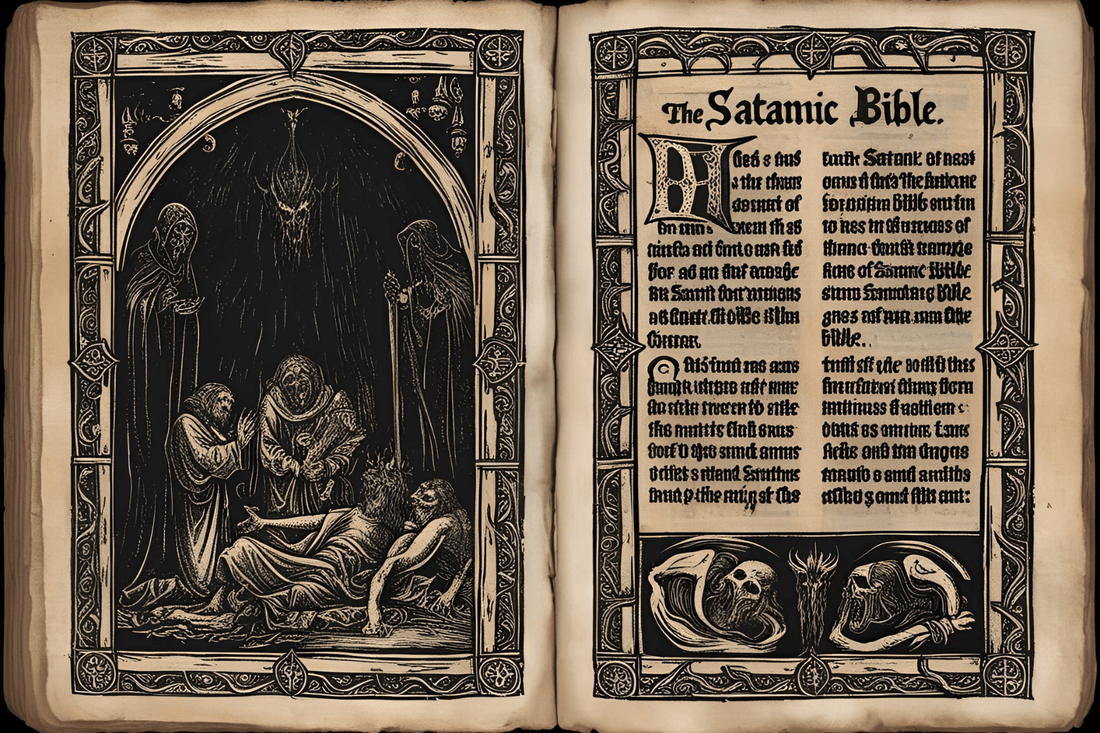
Is There a Holy Book in Satanism?
Share
When people hear the word "Satanism," they often assume it must have a holy book - something like the Bible or Quran, laying out its beliefs and moral code. But Satanism isn’t a single, unified religion. Instead, it’s a broad term covering different movements, some religious and others purely philosophical. Because of this, the idea of a central sacred text is complicated.
Some forms of Satanism embrace written works that shape their worldview, while others reject the idea of holy books altogether. The most well-known text associated with Satanism is The Satanic Bible, written by Anton LaVey in 1969. But is it truly a "holy book" in the way religious scriptures are? Does it carry divine authority, or is it simply a guide to a particular way of thinking?
This article will break down the concept of a holy book in Satanism, exploring whether any text holds that status and how different branches of Satanism approach written doctrine.

Understanding Satanism: Different Branches
Satanism isn’t a single belief system; it’s an umbrella term covering a range of ideologies, from religious to philosophical. Some see Satan as a literal deity, while others use the figure symbolically. To understand whether Satanism has a holy book, it's important to look at its main branches.
Theistic Satanism
Theistic Satanists believe in Satan as a supernatural being. Their views vary - some see him as a fallen angel, others as a pre-Christian deity, and some as a force of nature. Unlike mainstream religions, theistic Satanism doesn’t have a universally accepted scripture. Some groups adopt occult texts, grimoires, or even self-written spiritual works, but there is no single holy book comparable to the Bible or Quran.
LaVeyan Satanism
LaVeyan Satanism, founded by Anton LaVey in 1966, is atheistic. It doesn’t worship Satan as a real being but instead views him as a symbol of individualism, self-empowerment, and rebellion against arbitrary authority. The Satanic Bible is the core text of LaVeyan Satanism, but it lacks divine authority - it’s more of a manifesto outlining principles for personal freedom and indulgence.
Luciferianism and Other Variations
Luciferianism is sometimes considered a form of Satanism, though it focuses more on enlightenment and self-improvement than hedonism. Some Luciferians use esoteric texts, but again, there is no single holy book.
Modern Satanic movements, such as The Satanic Temple, take a secular and activist approach. They reject supernatural beliefs and promote rationality and humanistic values, relying on ethical principles rather than scripture.
Each of these groups approaches written doctrine differently, but none rely on a divinely inspired text in the way that traditional religions do. The question remains: does The Satanic Bible serve as a holy book, or is it something else entirely?
Is The Satanic Bible a Holy Book?
The most widely recognised text in Satanism is The Satanic Bible, written by Anton LaVey and published in 1969. Many assume it functions like the Bible does for Christians or the Quran for Muslims. But does it actually hold the status of a "holy book" within Satanism?
What Is The Satanic Bible?
The Satanic Bible is not a religious scripture in the traditional sense. It doesn’t claim to be divinely inspired, nor does it dictate commandments from a higher power. Instead, it is a collection of essays, philosophies, and rituals that form the foundation of LaVeyan Satanism. It promotes individualism, self-indulgence, and personal responsibility while rejecting the idea of external gods or supernatural beings.
The book is divided into four sections:
- The Book of Satan – A rejection of religious dogma and a call for personal empowerment.
- The Book of Lucifer – The philosophical core, covering topics like morality, power, and indulgence.
- The Book of Belial – A guide to Satanic magic and rituals.
- The Book of Leviathan – Focused on the power of words, emotions, and invocations.
How Does It Compare to Religious Scriptures?
Unlike the Bible or Quran, The Satanic Bible is not seen as sacred or infallible. It doesn’t claim to be the word of Satan, nor does it demand blind faith. Instead, it encourages critical thinking and self-determination. While many LaVeyan Satanists use it as a philosophical guide, they don’t worship it or treat it as divine revelation.
In contrast, religious scriptures are often regarded as absolute truth by believers, providing moral laws and commandments. The Satanic Bible, on the other hand, is more of a manifesto for personal freedom and rebellion against traditional religious constraints.
Do Satanists Consider It a Holy Book?
Some LaVeyan Satanists view The Satanic Bible as essential reading, but even among them, it is not treated as sacred or beyond criticism. Many see it as a starting point rather than a final authority. Other branches of Satanism, such as Theistic Satanism and The Satanic Temple, may reject or have little use for it at all.
Ultimately, while The Satanic Bible is the most influential text associated with Satanism, it does not function as a holy book in the way that religious scriptures do. It is a work of philosophy and ideology rather than divine law. However, it remains a defining text in the history of Satanism and continues to shape its perception in popular culture.
Other Writings Considered Significant
While The Satanic Bible is the most well-known text in Satanism, it is not the only one that has shaped Satanic thought. Various other writings, both from Anton LaVey and other sources, have influenced different branches of Satanism. Some of these works expand on The Satanic Bible, while others present alternative interpretations.
The Satanic Rituals (1972) – Anton LaVey
LaVey followed up The Satanic Bible with The Satanic Rituals, a book focused on formal ceremonies and magical practices within LaVeyan Satanism. While The Satanic Bible was more of a philosophical guide, this book provided structured rituals inspired by various mythologies, including Germanic, French, and ancient Egyptian influences. However, even these rituals were largely theatrical rather than religious in nature.
The Book of Lucifer (Contained Within The Satanic Bible)
One of the most significant sections of The Satanic Bible is The Book of Lucifer, which is essentially a collection of essays laying out the core philosophy of LaVeyan Satanism. This section is often cited separately because it contains much of the ideology that Satanists follow, dealing with topics like individualism, morality, and societal norms.
The Writings of Aleister Crowley
Though not strictly Satanic, Aleister Crowley’s works, particularly The Book of the Law, have influenced many occultists, including some theistic Satanists and Luciferians. Crowley’s philosophy of “Do what thou wilt” aligns with the emphasis on personal freedom found in Satanism. His focus on magic (or "magick," as he called it) has also influenced Satanic ritual practices.
The Grand Grimoire and Other Occult Texts
Some theistic Satanists draw inspiration from older occult works like The Grand Grimoire, a book of supposed demonic rituals dating back to the 16th century. Other grimoires, such as The Lesser Key of Solomon, have also been referenced in some forms of Satanic practice. However, these texts are more associated with ceremonial magic and demonology than with modern Satanic philosophy.
The Seven Tenets – The Satanic Temple
The Satanic Temple (TST), a modern activist organisation that promotes rationality and secularism, does not use The Satanic Bible. Instead, it follows The Seven Tenets, a set of ethical principles that emphasise compassion, justice, and personal autonomy. These tenets function as moral guidelines rather than religious scripture and are intended to be adaptable rather than absolute.
Do Any of These Writings Function as a Holy Book?
While these texts hold significance within different branches of Satanism, none serve the same function as a religious holy book. There is no single, universally accepted text that all Satanists follow. Instead, Satanism is largely non-dogmatic, with individuals encouraged to explore various writings and develop their own interpretations.
Unlike traditional religious texts, which are often viewed as divinely inspired and unchangeable, Satanic writings are typically seen as philosophical tools rather than sacred scripture. Whether following LaVey’s writings, occult grimoires, or modern ethical principles, Satanists generally prioritise personal understanding over absolute doctrine.
Theistic Satanism and Sacred Texts
Unlike LaVeyan Satanism, which is atheistic, theistic Satanists believe in Satan as a real, supernatural being. This belief can take many forms - some see Satan as a fallen angel, others as an ancient god, and some as a force of nature or a liberator of humanity. Given that many religions have sacred texts, does theistic Satanism have one?
Do Theistic Satanists Follow a Holy Book?
There is no single, universally accepted holy book for theistic Satanists. Unlike Christianity or Islam, which have fixed scriptures, theistic Satanism is highly individualistic. Some practitioners create their own spiritual writings, while others adapt texts from various sources, including ancient grimoires, occult books, and even Christian demonology.
Influence of Occult and Esoteric Texts
Many theistic Satanists look to historical occult writings for inspiration, though these are not considered divine revelations in the way that the Bible or Quran are. Some key texts include:
- The Grand Grimoire – A book of demonology and ritual magic, allegedly dating back to the 16th century. Some theistic Satanists use this as a guide for summoning demons and communicating with Satan.
- The Lesser Key of Solomon – A medieval grimoire that details methods for invoking spirits and demons.
- The Book of Shadows – Originally associated with Wicca, some Satanic practitioners use versions of this text for personal rituals and magical workings.
Self-Written Scriptures
Some theistic Satanists write their own sacred texts, believing they are inspired by Satan directly. These writings can include prayers, rituals, and personal revelations. Unlike traditional religious scriptures, these texts are often seen as personal rather than universal.
Why No Unified Holy Book?
The lack of a central holy book in theistic Satanism is largely due to its decentralised nature. There is no single organisation or leader defining doctrine, so beliefs and practices vary widely. While some may see Satan as a mentor or liberator, others view him as a ruler or father figure, leading to different interpretations and texts.
Comparison to Traditional Holy Books
Religious holy books, such as the Bible or Quran, claim divine authority and set strict guidelines for followers. In contrast, theistic Satanism embraces personal experience over written dogma. Even when sacred texts are used, they are often treated as references rather than absolute truth.
A Fluid Approach to Sacred Texts
Theistic Satanists may use various writings in their practice, but there is no single holy book that defines their beliefs. Unlike Christianity or Islam, where scripture is central to faith, theistic Satanism tends to be more fluid, allowing individuals to shape their own spiritual path. Whether drawing from ancient grimoires, personal revelation, or occult philosophy, theistic Satanists prioritise direct experience over written commandments.
The Satanic Temple’s Perspective
The Satanic Temple (TST) is one of the most visible modern Satanic organisations, but it takes a very different approach from both LaVeyan and theistic Satanism. Unlike groups that look to The Satanic Bible or occult texts for guidance, TST does not have a holy book at all. Instead, it focuses on secular activism, rational thought, and humanistic ethics.
No Scripture, No Dogma
One of TST’s core principles is the rejection of religious dogma. While many traditional religions rely on sacred texts as a source of divine law, TST argues that moral and ethical decisions should be based on reason, science, and human empathy rather than scripture. This means there is no "word of Satan" or a divinely inspired text within their belief system.
The Seven Tenets: A Modern Ethical Code
Instead of a holy book, TST follows The Seven Tenets, which serve as guiding ethical principles. These tenets emphasise values like compassion, justice, and bodily autonomy. They are designed to be adaptable and subject to revision based on new knowledge and social progress - something that sets them apart from traditional religious commandments.
The Seven Tenets include:
- Striving to act with compassion and empathy toward all.
- Fighting for justice and opposing tyranny.
- Respecting bodily autonomy.
- Holding beliefs in line with scientific understanding.
- Recognising the fallibility of human institutions and beliefs.
- Upholding personal freedoms while not infringing on others' rights.
- Pursuing a noble life based on reason and wisdom.
While these principles function as a moral framework, they are not treated as divine law, and members are encouraged to interpret them critically rather than follow them blindly.
A Rejection of Religious Authority
TST’s refusal to adopt a holy book aligns with its broader mission of challenging religious influence in politics and law. By rejecting scripture, the organisation positions itself against traditional religious structures that impose absolute moral codes. Instead, it advocates for secularism, scientific inquiry, and individual rights.
How TST Differs from Other Forms of Satanism
Unlike LaVeyan Satanism, which embraces The Satanic Bible, or theistic Satanism, which sometimes draws from occult texts, TST views all religious scripture as inherently flawed. It does not consider Satan a literal being but rather a symbol of rebellion against tyranny and oppressive institutions.
Ethics Without a Holy Book
For The Satanic Temple, a holy book is unnecessary. Instead of relying on scripture, TST promotes a flexible, evolving ethical code rooted in reason and empathy. This approach makes it distinct from both religious and philosophical branches of Satanism that draw from written texts. While some Satanic groups use books as sources of guidance, TST believes moral decisions should be based on logic and evidence rather than divine commandments.
In conclusion
So, does Satanism have a holy book? The answer depends on how you define "holy." While The Satanic Bible is the most widely recognised text associated with Satanism, it is not a sacred or divinely inspired scripture in the way religious texts like the Bible or Quran are. Instead, it is a philosophical work, laying out the foundations of LaVeyan Satanism, which rejects the supernatural entirely.
Other branches of Satanism take different approaches. Theistic Satanists, who believe in Satan as a real entity, sometimes draw from occult texts like The Grand Grimoire or The Lesser Key of Solomon, but there is no universally accepted scripture. Some create their own writings, while others base their beliefs on personal spiritual experiences rather than any fixed text.
The Satanic Temple, a modern and politically active organisation, takes an entirely different stance by rejecting religious dogma and scripture altogether. Instead of a holy book, it follows The Seven Tenets, a flexible set of ethical guidelines based on reason and justice.
What all these groups have in common is a rejection of blind faith. Whether they follow The Satanic Bible, ancient grimoires, or personal philosophy, Satanists generally prioritise personal freedom, critical thinking, and individual interpretation over absolute religious doctrine. Unlike traditional religions that rely on sacred texts as ultimate authority, Satanism - regardless of its form - encourages questioning and self-determination.
In the end, while certain books are influential within Satanism, there is no single, universally accepted holy book. Instead, Satanic thought is shaped by a range of writings, philosophies, and personal beliefs, making it one of the most fluid and adaptable belief systems in the modern world.













